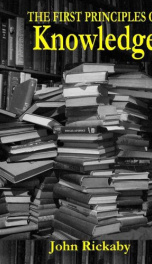the first principles of knowledge

Little as the modern representatives of the Schoolmen are satisfied, either with the spirit of Mr. Mill's demand, or with the mode of his own response to it, they have deemed it well worth while, not indeed to change the old Logic, but to add to it a new book. Pure Logic remains substantially what it was, and is justified in its position. It assumes, as all other sciences do and must, that human thought has, in general, objective reality; and on this most legitimate assumption it proceeds to lay down the laws of orderly, consistent thinking. The newly added part of Logic, often called Material, Applied or Critical, takes for its special purpose to defend the objective reality of thought. It is thus an assertion of a form of realism, as against idealism, and is called in this book the Philosophy of Certitude. For the whole question comes to this: what reasonable account can be given of man's claim to have real certainty about things? What are the ultimate grounds for holding, that man may regard his knowledge about objects as undoubtedly correct? Scientifically to draw out the account here demanded is a work appositely described by the title, The First Principles of Knowledge. Manuals of Catholic philosophy by John Rickaby.
Info about the book
Author:
Series:
Unknown
ASIN:
B0083J6UVS
Rating:
5/5 (8)Your rating:
0/5
Languge:
English
Users who have this book
Users who want this book
What readers are saying
What do you think? Write your own comment on this book!
write a commentGenre
if you like the first principles of knowledge try:
Other books by this author
Do you want to read a book that interests you? It’s EASY!
Create an account and send a request for reading to other users on the Webpage of the book!


